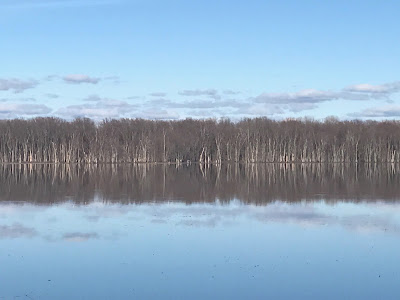 |
| Relatively high lake levels on April 25, 2019, invading wetlands near Alburgh, Vermont, as the lake should do every spring. The cycle of high water each spring helps the ecosystem. |
Many of of us watch the Lake Champlain level each spring. On the negative side, if the water gets too high, we have to worry about flooding. If it doesn't rise much, it could hurt the ecosystem in and around the lake, as many plants and animals depend upon natural high and low water cycles.
As of yesterday, the lake level stood at 98.2 feet above sea level. As WPTZ meteorologist Ben Frechette pointed out today, that's actually a little higher than normal for this date. The lake on average peaks in the final days of April at around 98.5 feet. Flood stage is 100 feet.
If you look at the chart Frechette helpfully provided on Twitter today, the lake started rising sooner in the spring than normal, but at about the same rate at usually does.
That reflects the early onset of mountain snow melt during our warmer than normal March. Much of the snow melted off the hills prematurely, so the lake level went up early. The lake might start to recede early, too, if weather for the rest of the month is either normal or drier than average.
How high the lake gets this year depends on how much rain we receive. Snow melt will soon start to s get less and less important as there's just not all that much snow in the mountains left to melt.
The lake appeared to reach an early peak of 98.26 feet on Saturday, and then started a slight decline. That still seems high enough to keep the ecosystem happy.
There's a good chance the lake will have at least one more burst of rising levels toward this weekend if current weather forecasts pan out.
We have the potential for some fairly heavy rain on Thursday. Forecasters say the rain could be heavy enough to cause sharp rises on rivers, possibly even with some minor flooding. Since so many rivers feet into Lake Champlain, that storm, if it comes will lead to higher lake levels. It could even come close to 99 feet if there's a lot of rain late this week.
From there, the lake will start to recede again late next week, unless more wet storms arrive.
Even if that storm hits Thursday, I don't think Lake Champlain will hit flood stage this year, unless we have some very heavy rain storms between now and mid-May.
At 100 feet, you start to see erosion problems on the shore, some roads covered in water, and maybe a few very low lying camps see flooding. At 101 feet, the flooding gets pretty serious, but I really doubt that will be a problem this year.
 |
| You don't want the lake to get too high, though. Photo that I took in 2011 shows record high Lake Champlain levels destroying camps in Burlington, Vermont. |
The relatively high water we are seeing is a good thing, and it's even better if lake rises even a bit more this month.
The ecosystem of Lake Champlain really depends on higher water each spring.
The rise and fall of Lake Champlain in the spring helps ensure healthy wetlands which all kinds of plants and animals depend upon.
The federal Environmental Protection Agency calls wetlands "biological supermarkets," which provide food for a wide variety of animal species. Lake Champlain has tons of wetlands along its edges, which helps the ecosystem throughout the Champlain Valley and beyond. So you want those wetlands to work the way they're supposed to.
Of course, as we learned in 2011, too much water and snow melt are a really bad thing. That year, the lake shattered the record for its highest level ever seen, at 103.2 feet. The lake level in 2011 stayed above 102 feet for more than a month.
The flood easily caused more than $6 million in damage.
There is of course no way that flood will repeat itself this year. Instead, we should just enjoy the natural lake cycle, even if it is happening a little earlier than average.

No comments:
Post a Comment